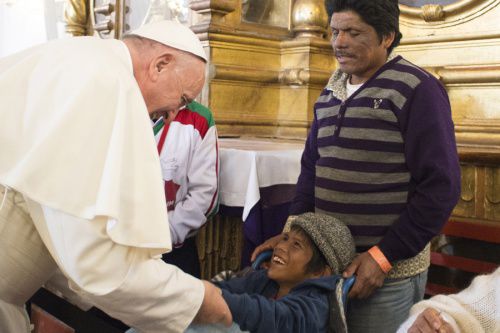For Bishop Oscar Cant√∫ of Las Cruces, Pope Francis had a simple message to tell the people of Mexico: “you are not forgotten.”
Bishop Cant√∫, who chairs the U.S. bishops’ committee on international justice and peace, said the Pope’s visit showed Mexico “that the Holy Father cares about you, and that God is with us even in difficult moments, even in the darkness of life.”
He was one of two U.S. bishops who took part in every Mass which Pope Francis celebrated in Mexico during his Feb. 12-18 trip.
The bishop, whose see is in the U.S. state of New Mexico, spoke with CNA Feb. 25 during a visit to Rome. He said the Pope showed his presence as a pastor for Mexicans and acted in the spirit of Our Lady of Guadalupe.
He was particularly struck by the Pope’s approach to Mexico’s indigenous people; the Roman Pontiff had told them they should be included in the decision-making of society and that their dignity should be elevated.
Bishop Cant√∫ also noted the Pope’s encouragement for victims of violence. The Roman Pontiff also told young people that they have something to contribute to the good of society and of Mexico.
“As Christians we are a people of hope,” Bishop Cant√∫ said.
On Feb. 17 Pope Francis visited the U.S.-Mexico border at Ciudad Juarez. He waved to those on the other side of the border fence, out in the west Texas town of El Paso.
“I think he wanted to give a human face to migrants,” Bishop Cant√∫ reflected. “They are people. They are human beings. Most of them are very, very well-intentioned and good people.”
These migrants are trying to escape violence, “crushing poverty” and a bad economy, the bishop continued. He encouraged people to look to the root causes of migration: economic and trade policy and lack of infrastructure investment.
“I think that there are sensible solutions that are consonant with the Gospel,” Bishop Cant√∫ said.
The bishop said that Pope Francis had stern words for the Mexico government about its responsibility to provide for the good of Mexico. The Pope also spoke of Mexico’s responsibility to provide a job-supporting economy so that people can raise their families and are not forced to emigrate.
The Church does not believe in open borders, and believes in a country’s right to protect its borders, according to Bishop Cant√∫. The Church also encourages countries to cooperate with their neighbors.
Migration has played a significant role in the bishop’s own life. His father came to the U.S. from Mexico in the mid-1950s to look for work.
“He grew up on a farm and he didn’t see a future in farming in northern Mexico. He went with one of his brothers and a cousin to Chicago. They worked odd jobs and made a living,” the bishop said.
The bishop’s father met his mother one summer when he returned to Mexico to visit. “The next summer he married her and brought her up to Chicago,” he said, and they became American citizens.
“In a way their hearts were always in Mexico,” Bishop Cant√∫ reflected. “I love Mexico. I consider myself Mexican in heart. I also love America. This is where I was born.”
“There’s no dichotomy in being a Mexican-American. We love both countries because we have part of ourselves in both countries.”
He said it had become much more difficult for immigrants to become American citizens.
“I think that there are some sensible ways that we can update the laws of immigration in our country,” he said. “Something that everybody agrees on is that our immigration laws are broken. I think we are wise enough and smart enough to fix them. It just takes some political will and some courage.”
Bishop Cant√∫ is one of the signers of a petition to U.S. Secretary of State John Kerry about the situation facing Christians in Iraq and Syria. The petition asks the U.S. government to recognize as genocide the Islamic State’s atrocities against Christians and other religious minorities.
The bishop said the petition is important to show that the world is watching the situation and to help ensure that the Islamic State does not go unpunished.
“That they have killed Christians simply for the fact that they are Christians. I think it is important to call it what it is.” Bishop Cant√∫ also spoke of the Obama administration’s efforts to close the United States’ Guantanamo Bay detention facility in Cuba, noting that “the bishops’ conference has supported for some time the closing of Guantanamo.”
He said there are human rights issues with U.S. policy there. Accused terrorist detainees have been held there without trial for many years.
“I think that Guantanamo represents a stain on the soul of America. We need to hold ourselves to the same standard that we hold others,” Bishop Cant√∫ said. He advocated that the detainees be released “with some responsibility, knowing that here is some probability that they have committed crimes.”

